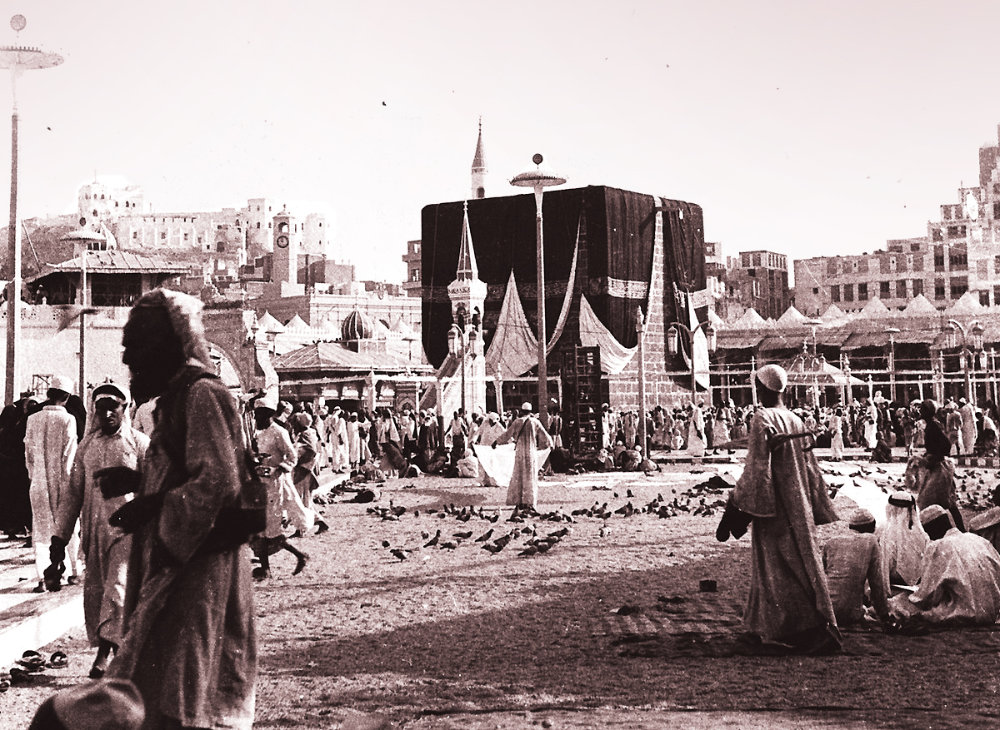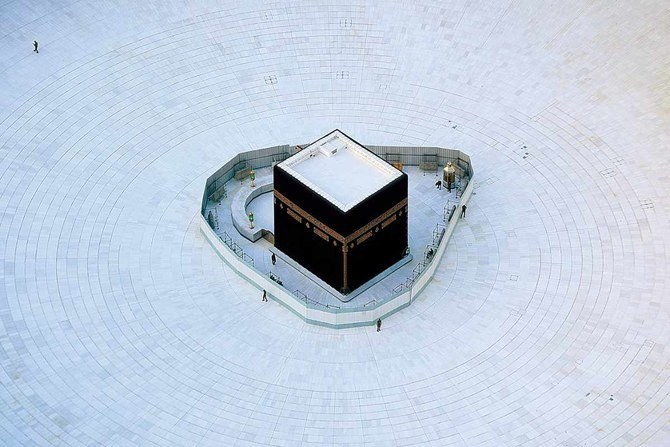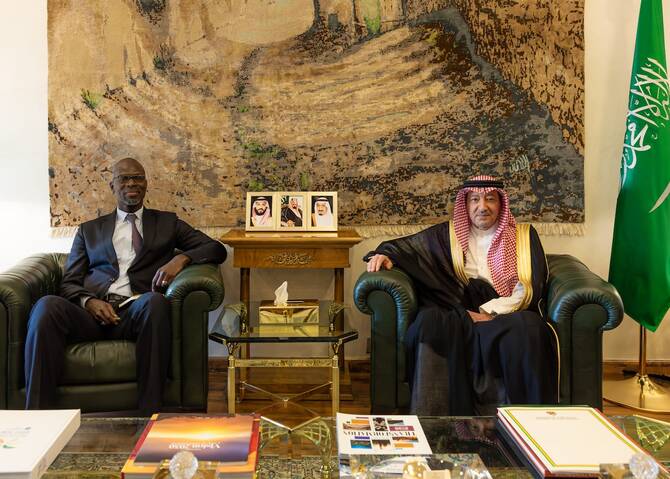JEDDAH: Will the Hajj, which draws millions of Muslims annually to Islam’s birthplace in Saudi Arabia, be suspended this year owing to the global coronavirus pandemic?
That question had been uppermost in the minds of millions of Muslims worldwide even before a Saudi official asked them to put on hold any plans to perform the obligatory pilgrimage, scheduled to begin in late July.
“We’ve asked our Muslim brothers around the world to wait” before making Hajj plans “until there’s clarity,” Dr. Muhammad Salih bin Taher Banten, minister of Hajj and Umrah, told state-run Al-Ekhbariya TV in comments on March 31 that quickly bounced around the world.
He added: “We've asked the world not to rush with regards to Hajj groups until the path of the epidemic becomes clear, keeping in mind the safety of pilgrims and public health as a priority.”
Saudi Arabia’s Ministry of Health has taken the whole gamut of precautionary measures to control the spread of COVID-19 infection in Makkah and Madinah, yet a total of more than 480 active cases have been reported in the two holy cities so far.
Last month, the Kingdom suspended the Umrah pilgrimage until further notice, halted all international passenger flights indefinitely, and blocked the entry and exit to several cities, including Makkah and Madinah.
There have been 25 deaths reported among more than 2,000 COVID-19 cases in Saudi Arabia.
Globally, more than 1,000,000 people have been infected and nearly 59,000 of them have died.
Against this backdrop, a decision to suspend the Hajj may seem at once inevitable and unprecedented.
In actual fact, the pilgrimage has experienced disruptions through the centuries due to circumstances beyond the control of Hajj authorities.
According to a report published by the King Abdul Aziz Foundation for Research and Archives (Darah), the first time the Hajj was interrupted was in 930 AD when the Qarmatians, a syncretic branch of Sevener Ismaili Shiite Islam that revolted against the Abbasid Caliphate, attacked pilgrims on the eighth day of Hajj.
The report says the Qarmatians, convinced that performing the Hajj was an act of idolatry, killed more than 30,000 pilgrims that year, desecrated Makkah’s Zamzam well with corpses, and ran off with the Black Stone of the Kaaba back to Hajr (Qatif nowadays), their capital on the Arabian Gulf at that time.
On account of the bloody assault, the Hajj was not performed for another 10 years, according to the Darah report.
The next disruption happened in 968 AD, says the report, citing Ibn Kathir’s book “Al-Bidaya wan-Nihayah.” It said a disease spread inside Makkah and claimed the lives of many pilgrims.
The Prophet Muhammad said, ‘If you hear of an outbreak of a plague in a land, do not enter it.’
At the same time, camels used for transporting pilgrims to Makkah died owing to a scarcity of water.
“Many of those who managed to reach Makkah safely could not live long after Hajj for the same reason,” according to the Darah report
Among those who came to Makkah to perform the Hajj in significant numbers were Egyptians.
But in 1000 AD, they could not afford to undertake the journey because of the high cost of living in the country that year.
Some 29 years later, no pilgrims from the East or Egypt came for the Hajj. According to the Darah report, in 1030 only a few Iraqi pilgrims managed to reach Makkah to perform the Hajj.
Nine years later, Iraqi, Egyptian, Central Asian and north Arabian Muslims were unable to perform the Hajj.
Dr. Emad Taher, head of the history department at King Abdul Aziz University, said the reason was political unrest and sectarian tensions.
Similarly, no one performed the Hajj in 1099 owing to fear and insecurity across the Muslim world as a result of wars.
Opinion
This section contains relevant reference points, placed in (Opinion field)
Some five years before the Crusaders seized Jerusalem in 1099, lack of unity among Muslim rulers of the Arab region meant that no Muslims could manage to reach Makkah to perform the Hajj.
In 1168, Egyptians found themselves locked in confrontation with Kurdish Commander Asaduddin Shirkuh, who was hoping to extend the Zangid dynasty to Egypt. The situation naturally did not allow Egyptians to perform the Hajj.
The pilgrimage was again disrupted in the 13th century. The Darah report says no people from outside the Hijaz region could perform the Hajj between 1256 and1260.
French leader Napoleon Bonaparte’s military campaign in the Ottoman territories of Egypt and Syria from 1798 to 1801 made the standard routes to Makkah unsafe for pilgrims.
More than two centuries on, a global pandemic has cast a huge shadow of uncertainty on the Islamic pilgrimage.
Hani Nasira, an Egyptian academic and writer, said if COVID-19 cases worldwide continue to increase, a decision to halt the Hajj should come as no surprise.
“If imposed, such a decision will be wise and in full compliance with the Islamic Shariah, which basically aims to protect and preserve peoples’ lives,” he told Arab News.
“In the Holy Qur’an, Allah says, ‘and do not kill yourselves.’ Also, the Prophet Muhammad warned his companions against epidemics.

Muslims visit the Kaaba during a pilgrimage to Makkah in 1954. (AP)
“Abdulrahman bin Awf narrated that the Prophet Muhammad had said, ‘if you hear of an outbreak of a plague in a land, do not enter it; but if that epidemic breaks out in a place while you are in it, do not leave that place.’ This Hadith shows the significance of avoiding plagues.”
Nasira noted that the COVID-19 outbreak has claimed thousands of lives across the world and shows no sign of abating.
“The whole world is suffering from the swift spread of the coronavirus, which has filled people everywhere with unprecedented dread,” he told Arab News.
“With scientists having little information about the virus, a cure isn’t likely to come out soon, so the continuation of the situation makes suspending the Hajj necessary to protect lives.”
Nasira drew attention to the fact that some Muslim countries, including Iran and Turkey, are among the biggest casualties of the pandemic.
“We don’t want to add fuel to the fire. It’s illogical, and Islam also never accepts or approves that. If I were a mufti, I wouldn’t hesitate to call for a suspension,” he said.
Ahmed Al-Ghamdi, a researcher of Islamic studies, pointed out that the Hajj is not a limited ritual in the sense that it can be carried out at least once in the lifetime of an adult Muslim.
“Performing the Hajj isn’t limited to a specific time. An adult Muslim can perform the Hajj whenever he or she likes once they’ve reached the age of discretion,” he told Arab News.
“Prophet Muhammad, for instance, didn’t perform the pilgrimage in the first year the Hajj became a duty. He made his Hajj a year later,” said Al-Ghamdi, who specializes in Hadith and Islamic sciences. Like Nasira, he maintains that Islamic Shariah strongly backs public interest and wellbeing.
“In case of dire necessity, such as because of the spread of the coronavirus disease, political reasons or security compulsions, the Hajj can be suspended and this doesn’t contradict Islamic teachings,” Al-Ghamdi said. “The Almighty has ordered us to not expose ourselves to danger.”
Moreover, Al-Ghamdi said, the Hajj is founded in reason and logic, so if health officials find that a contagious sickness can cause deaths, preserving people’s lives is more important than the pilgrimage itself. “Nothing is wrong with this line of reasoning in Islamic Shariah,” he added.















